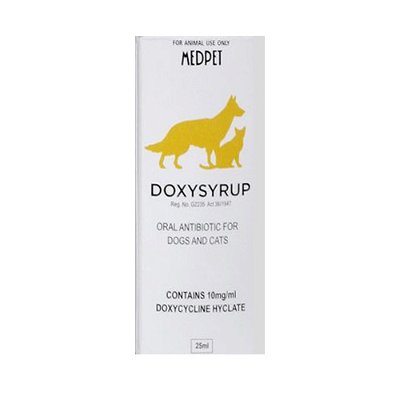-
Popular Brands View All BrandsPopular Brands View All BrandsPopular Brands View All BrandsPopular Brands View All BrandsPopular Brands View All Brands
- Dogs
- Cats
- Brands
- New Arrivals
- Below R150
- Refer & Save More
- Easter Sale

Doxysyrup is broad spectrum antibiotic syrup for small dogs and cats. It treats snuffles (herpes) in cats. The oral formulation is safe to use for extended periods when treating chronic conditions such as Haemobartonella, Campylobacter, Staph aureus, Pyodermas, Osteomielites and Prostatites. The highly palatable syrup is easy to dose and has no known side effects. The special syrup formulation reduces the risk of vomiting associated with doxycycline capsules.
For Dogs:
For more severe infections, such as chronic urinary tract infections, a dosage of 5 mg/kg every 12 hours is recommended.
For Cats:
For more severe infections, such as chronic urinary tract infections, a dosage of 5 mg/kg every 12 hours is recommended.
It's important to adhere to these dosages to ensure optimal effectiveness and minimize the risk of side effects. Please consult with your veterinarian for specific dosing instructions tailored to your pet's condition
Caution:
Active Ingredients: Doxycycline Hyclate
Application: Oral
Species: Cats & Small Dogs
Product Type: Antibiotics
Manufacturer: MedPet
Brand: MedPet
I recently purchased Doxysyrup for my cat who was suffering from a bacterial infection. I was a bit skeptical about using an oral antibiotic for my feline friend, but to my surprise, it worked wonders! My cat's condition improved significantly within just
A: Doxysyrup is indicated for treating snuffles in cats. Additionally, it is safe to use for extended periods when treating chronic conditions including Haemobartonella, Campylobacter, Staph aureus, Pyodermas, Osteomielites and Prostatites.
A: Doxysyrup is recommended for treating “snuffles” in cats. It is also suitable for use for prolonged periods when treating chronic conditions including Haemobartonella, Campylobacter, Staph aureus, Pyodermas, Osteomielites and Prostatites.